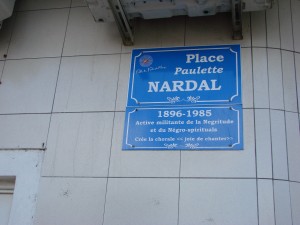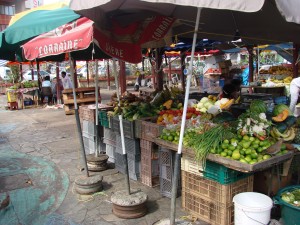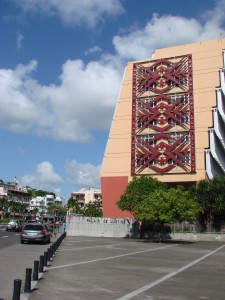Though I was reluctant to leave the comfortable and immediately familiar confines of the Bibliothèque Schoelcher, with its singing librarians, student groups clattering through, historic atmosphere and lovely smell of library binding, I needed to go to the Archives.
There are few things scarier to me than the first visit to a French archives or library. French bureaucracy is designed to intimidate and put you in your place as a petitioner yearning for access to the treasures of a great civilization. However, once you have gained access, the staff are always wonderful~ helpful, patient, and kind, willing to speak slowly and clearly. Knowing that didn’t diminish the feeling of arming for battle as I packed up my book-bag last night: I forgot to get a letter from the Dean, on letterhead (the French love letterhead); I forgot to bring the little pack of photos d’identité that I always bring to France; and I didn’t have pencils (some archives don’t allow people to bring ink pens anywhere near rare documents.)
The Archives Départementales de Martinique opens at 7:30, so I rose early, and fortified by a cup of gritty coffee and miniscule container of mango yoghurt, ventured forth into yet another gorgeous day in paradise: past brilliantly cascading flowers of all colors beneath a sharply clear blue sky decorated with painterly, swollen white clouds. The ferry, which doesn’t run on the posted schedule in the off-season, came within a few minutes, and perhaps because it was so early, was filled mostly with people obviously going to work, with their briefcases and high heels. I sat at the front of the boat, marveling that the day could already be so humid and warm.
With a colleague’s detailed instructions, I made my way to the Aliker Terminal (the terminal is named after a courageous  journalist whose investigations into governmental and béké corruption got him killed inn the 30s), and waited in the front of a lovely cemetery for bus number 26. Along the way I saw a new neighborhood of Fort-de-France, of broader boulevards and what seemed to be 60s-era government buildings, the market at Place Paulette Nardal (the sign recognizes her as a militante and activist for Négritude, as well as a choir mistress), many small eateries diffusing lovely smells, and Martinicans moving as city people the world over do in the mornings, despite the heat.
journalist whose investigations into governmental and béké corruption got him killed inn the 30s), and waited in the front of a lovely cemetery for bus number 26. Along the way I saw a new neighborhood of Fort-de-France, of broader boulevards and what seemed to be 60s-era government buildings, the market at Place Paulette Nardal (the sign recognizes her as a militante and activist for Négritude, as well as a choir mistress), many small eateries diffusing lovely smells, and Martinicans moving as city people the world over do in the mornings, despite the heat.  The Number 26 came; the driver promised to let me know when he got to the Archives, and then things went downhill… literally. Despite my attention to the intriguing scenery that passed behind the bus windows as we wound our way up impossibly steep and narrow streets, I didn’t see the Archives, and the bus driver said nothing. When I was sure that what I was gazing at was familiar and we were definitely going downhill instead of up, I asked the driver about the Archives. Yes, we had passed them ~ they were at the top of the hill~ why didn’t I remind him? Fortunately, I only had to walk a few minutes to a bus stop going in the other direction, and within 20 minutes I was at the Archives.
The Number 26 came; the driver promised to let me know when he got to the Archives, and then things went downhill… literally. Despite my attention to the intriguing scenery that passed behind the bus windows as we wound our way up impossibly steep and narrow streets, I didn’t see the Archives, and the bus driver said nothing. When I was sure that what I was gazing at was familiar and we were definitely going downhill instead of up, I asked the driver about the Archives. Yes, we had passed them ~ they were at the top of the hill~ why didn’t I remind him? Fortunately, I only had to walk a few minutes to a bus stop going in the other direction, and within 20 minutes I was at the Archives.
The président of the salle de lecteur examined my passport, even flipping through the pages (I wondered if she was looking for my visa, to double check that I was in the country legally, but she was looking for an address) and checking the photo against my face two or three times. She then interrogated me about my research, and which themes and “pistes” I was following. I replied, summarizing my thesis and research methodology, apologizing as usual for my French (wondering if she might decide that it wasn’t good enough to give me permission to read their holdings~ would I have to tell her that last fall I earned a B1 in the Cadre Européen Commun de Référance pour l’apprentissage et l’enseignement des langues ?) Finally satisfied, she gave me my card, and suddenly was very friendly~ explaining that she was Haitian, and her French wasn’t very good either (with a big smile), explaining everything to me and saying if I had any questions or needed any help, to come right to her. She seemed to be beaming approval at my project and encouragement for my efforts with both French language and feminist scholarship.
But the travails of initiation were not over yet. Next was managing the catalogue~ looking at the mostly handwritten cards in the wooden drawers yielded nothing (the only card for Suzanne Césaire was one referring to Tropiques, and there was nothing on the Nardals or Lucie Thésée). Next stop, the computer catalogue and figuring out which “fond” might be fruitful. The personal paper collections all seemed to belong to colonial governors and functionaries. I was briefly distracted by a collection of other 1000 vintage postcards. OK, periodiques. Three strikes, but three hits for my top priority periodicals. Hooray! When I made the request through my reader’s account, the computer kept telling me that the number does not exist. I varied the format: spaces, no spaces, slash after the year as well as before…. I had read the instructions twice and they had seemed straightforward. The Haitian woman came to my rescue, perceiving my bewilderment from behind her counter. Of course when I read off the numbers to her and she typed them in, voilà! Triumph! I have found what I need, it appears at my desk. I’m authorized and my government-issued wand and it works. I’m in!
And the view from my desk was lovely~ while waiting for my “demande” to be retrieved, I stood looking though louvered windows over a tree bursting with red blossoms, over the characteristic Créole red tile roofs nestled in dense greenery, and not too far~ as it is never too far~ the blue-green bay, its horizon somehow much higher than the coastline.
The periodical I requested is called L’Etudiant Martiniquais, the journal associated with a support group for Martinican students studying in Paris in 1932. A small group of ambitious students found it hard to adjust to a cold climate and the very urban life of the metropole.
« Nous tacherons donc que ce journal soit comme exact miroir où se refléterait notre vie. Notre destin est en d ‘autre mains, pour une part, mais le destin de cette humble feuille est tout entre les nôtres. »
(« We will attempt to make this journal an exact mirror where our life will be reflected. Our destiny is in other hands, for the most part, but the destiny of this humble sheet of paper is totally in our own. »
No photographs are allowed in the Archives, so I can’t share with you the vision of these brittle yellow pages, nor can you hear the dynamic and hopeful voices of these university students, in Paris to study law, medicine, English literature… I had started reading the second volume when the Library closed. It started with a copy of a letter to the Conseil General of Martinique, politely but a with a light tone (perhaps that Martinican 18th century elegance that doesn’t take oneself too seriously) inquiring why there had been no response to the previous letter asking for support for the organization. The letter must have been lost in the bottom of a drawer, the editor speculates, for surely if Monsieur had seen this earnest plea, he would have responded.
I took the bus back to the bottom of the hill, then walked toward the docks. I stopped by an open-air stand to have the best smoothie (made with local fruits and no sugar) that I have ever tasted. A Latin band was rehearsing across the street, and the insistent rhythms of meringue and salsa ignited the air, causing all the passersby to sway their shoulders and adjust their stride.


3 Responses to In a French Archive